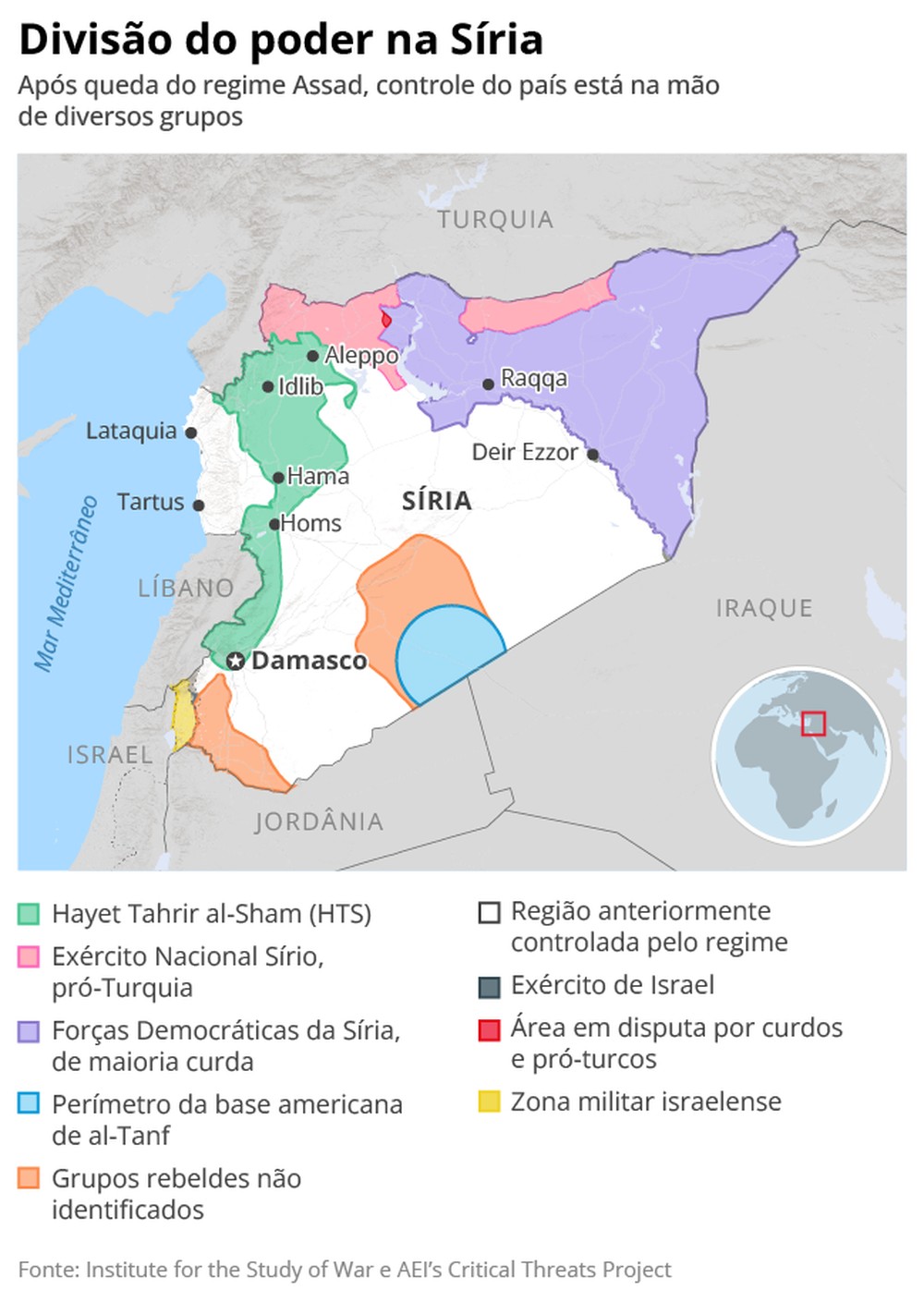Abu Mohammad al-Julani(editado há uns poucos mais de 12 minutos)
https://en.wikipedia.org/wiki/Abu_Moham ... cal_career
Iraq War
According to an interview with Frontline in 2021, al-Julani stated he was radicalized by the Palestinian Second Intifada in 2000 when he was 17 or 18 years old. "I started thinking about how I could fulfil my duties, defending a people who are oppressed by occupiers and invaders," he said.[22][23]
Appreciative of the 9/11 attacks,[19] al-Julani traveled from Damascus to Baghdad by bus just weeks before the 2003 invasion of Iraq, where he quickly rose through the ranks of Al-Qaeda in Iraq (AQI).[22] The Times of Israel newspaper claimed that al-Julani was a close associate of AQI leader, Abu Musab al-Zarqawi.[3]
However, in his 2021 interview with Frontline, al-Julani denied ever meeting al-Zarqawi and claimed he served only as a regular foot-soldier under al-Qaeda in Iraq against American occupation. Before the eruption of the Iraqi civil war in 2006, al-Julani was arrested by American forces and imprisoned for over five years in various facilities, including Abu Ghraib, Camp Bucca, Camp Cropper and al-Tajji prison.[24]
(...)
Formation of Tahrir al-Sham (HTS)
Tahrir al-Sham (HTS)
On 28 January 2017, al-Julani announced the dissolution of Jabhat al-Fath al-Sham and its merger into a larger Syrian Islamist organization, Hayat Tahrir Al Sham ("Assembly for the Liberation of the Levant" or HTS).[17] The U.S. government quickly rejected this rebranding, with the U.S. Embassy in Syria stating that "The core of HTS is Nusra, a designated terrorist organisation. This designation applies regardless of what name it uses or what groups merge into it." The Embassy characterized HTS's formation as an attempt to "hijack the Syrian revolution" rather than a move toward moderation.[37]
Despite this stance, under HTS, the group prioritized combating Al-Qaeda and ISIS in an effort to improve its standing with Western nations. HTS successfully defeated ISIS, Al-Qaeda, and most opposing forces in its territory, establishing control over most of Idlib Governorate, which it administers through the HTS-aligned Syrian Salvation Government.[17]
In mid-2020, al-Julani increased his public presence in Idlib to build popular support. HTS-affiliated media significantly expanded its output during this period, releasing multiple daily videos showcasing governance activities, tax distribution in rural areas, frontline operations, and al-Julani's meetings with local militia groups.[
citation needed]
Idlib governance
Under al-Julani's administration, Idlib had experienced significant development, becoming Syria's fastest-growing region despite being historically its poorest province. The area featured new luxury shopping malls, housing estates, and round-the-clock electricity supply surpassing that of Damascus. Educational facilities included a university with 18,000 segregated students. However, his administration faced criticism for its taxation policies, including customs taxes on goods from Turkey and checkpoint fees on smuggled goods, as well as the economic impact of the Turkish lira's depreciation, which was the main currency in the region.[36]
In March 2024, widespread protests erupted in Idlib Governorate against al-Julani's rule, with demonstrators adopting the slogan "Isqat al-Jolani" ("Down with Jolani"), reminiscent of earlier protests against the Assad regime. For over a month, hundreds and sometimes thousands of protesters marched through Idlib's cities and towns. The protests were triggered by multiple factors, including allegations of brutality, with reports of thousands of critics held in prisons, and economic grievances related to high taxes.[36]
In response to the unrest, al-Julani made several concessions. He released hundreds of detainees from a previous summer's security operation, including his former deputy Abu Maria al-Qahtani, who had been arrested along with 300 others in a purge of his movement. He also promised local elections and increased employment opportunities for displaced persons, while warning protesters against what he termed treachery. [36]
Turkey, which had previously helped stabilize the province by connecting it to its electricity grid and allowing building materials to enter freely, had grown concerned about al-Julani's expanding influence. In response, it reduced trade through its border crossings with Idlib, affecting HTS's revenue. Reports indicated that al-Julani had twice attempted to take over other Turkish-administered areas in northern Syria.[36]
Rebel takeover (November – December 2024)
In late November 2024, al-Julani led HTS in its Deterrence of Aggression offensive against the pro-Assad Syrian Arab Army.[37]
On 1 December 2024, The Week magazine reported unconfirmed claims circulating in Arab media outlets and social media that Al-Julani had been killed in a Russian airstrike.[38] These claims were disproven when al-Julani visited the Citadel of Aleppo on 4 December 2024, following its capture by his forces earlier that month.[39][40]
During the capture of Aleppo, al-Julani instructed his forces not to "scare children" and HTS channels broadcast footage of Christians in the city continuing their normal activities. Archbishop Afram Ma'lui stated that services would not be affected by the change in control. After regime forces were expelled from the city, al-Julani declared "diversity is a strength." HTS quickly established administrative bodies to restore basic services, including garbage collection, electricity, and water. The group's General Zakat Commission began distributing emergency bread supplies, while its General Organization for Grain Trade and Processing provided fuel to local bakeries. The Ministry of Development and Humanitarian Affairs reported delivering 65,000 loaves of bread under a campaign called "Together We Return."[41]
On 6 December, in a face-to-face interview with CNN, al-Julani declared that the offensive's goal was to remove Assad from power. Using his real name, Ahmed al-Sharaa, he explicitly pledged to protect minority groups.[15] According to Dareen Khalifa of the International Crisis Group, al-Julani has considered dissolving HTS to strengthen civilian and military governance structures.[42] He also expressed his intention to facilitate the return of Syrian refugees to their homes.[43]
On 8 December, Syrian Prime Minister Mohammad Ghazi al-Jalali announced that the Syrian government would hand over power to a new elected government following the departure of al-Assad from Damascus, and al-Julani announced further that al-Jalali will "supervise state institutions until they are handed over". Al-Jalali later noted to Al Arabiya that al-Julani had been in contact with himself prior to the announcement to discuss the handover.[44]
.

